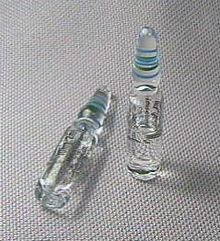

An ampoule (also ampul and ampule) is a small sealed vial which is used to contain and preserve a sample, usually a solid or liquid. Ampoules are usually made of glass.
Modern ampoules are most commonly used to contain pharmaceuticals and chemicals that must be protected from air and contaminants. They are hermetically sealed by melting the thin top with an open flame, and usually opened by snapping off the neck. The space above the chemical may be filled with an inert gas before sealing. The walls of glass ampoules are usually sufficiently strong to be brought into a glovebox without any difficulty.
Glass ampoules are more expensive than bottles and other simple containers, but there are many situations where their superior imperviousness to gases and liquids and all-glass interior surface are worth the extra cost. Examples of chemicals sold in ampoules are injectable pharmaceuticals, air-sensitive reagents like tetrakis(triphenylphosphine)palladium(0), hygroscopic materials like deuterated solvents and trifluoromethanesulfonic acid, and analytical standards.